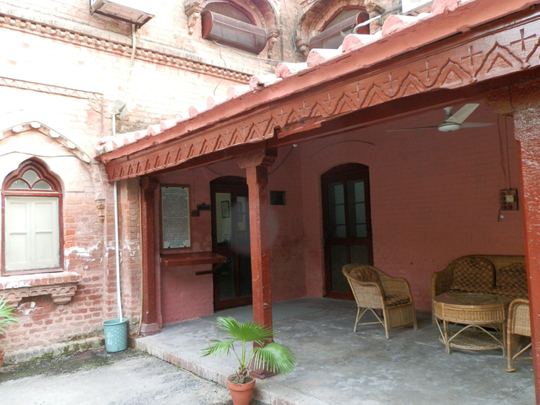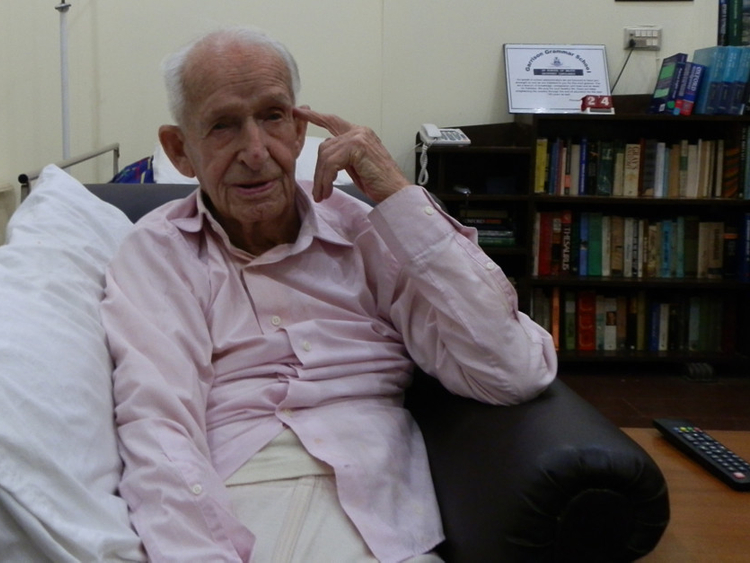
LAHORE
Sitting on the sofa, with a remote control in his hand, he is watching the news channel CNN.
There is serenity and a strange silence in the room as he watches, with the TV’s volume on mute.
This is no ordinary man. He is living legend Geoffrey Douglas Langlands, the former principal of Aitchison College in Lahore, who a few days ago celebrated his 100th birthday.
As his domestic worker, Bilal, introduces us, he looks up with a smile and is not startled at all. Though old and very weak, his blue eyes are shining.
His students and friends keep coming to meet him. Timings for seeing him are fixed. You have to get an appointment.
“Yes, I remember everything. You are a good man. We meet again after a long time,” Langland says in a feeble voice. This scribe is surprised at his good memory and replies, “God bless you for remembering me.”
We had a short meeting about a year ago. Then there is silence as this scribe tries to talk to him and wish him happy birthday. He does not talk much. He wants to converse but is unable to express his feelings.
Witness to Partition
A student from Aitchison College named Akaan enters the room. He has come to invite him for an art exhibition. Langlands is very kind to him and reads the invitation with a magnifying glass.
Earlier he did the same thing when this scribe presented him his business card.
The portion of Bahawalpur House where Langlands lives is now called Langlands House. It is simply furnished and adorned with pictures of his life in Pakistan.
Langlands was born on October 21, 1917 in Yorkshire, England ten minutes younger than his identical twin brother John Langlands. He was lucky to get free education at Kings College, Taunton, in Somerset, England and started teaching Class 2 at a private school in Croydon.
When the Second World War broke out in September 1939 Langlands joined the British Army in the ordinary rank and became a sergeant. In 1943, he was commissioned as a Captain and volunteered for service in the Indian Army. In August 1947, he was stationed in British India, where he witnessed the bloody partition of the Subcontinent at close quarters. Stuck on a train filled with refugees, he came under fire.
“It was terrible,” he recalls when asked about the incident.
He was transferred to Pakistan’s army, which he willingly accepted. In 1953 General Ayub Khan, then commander in charge of Pakistan’s army, sent for him and asked him to stay in the country, by which time he had become a Major.
Langlands agreed and Gen Khan had him hired as a teacher of English and mathematics at Aitchison College, Lahore. Soon after, he was made house master of Kelly House.
In 1954, he acted as headmaster of the Prep School of Aitchison and in 1974 was confirmed as official headmaster.
In 1979, it was demanded of him by the then Minister NWFP to give up his comfortable job at Aitchison and take on a more challenging job at RAZMAK Cadet College, deep in the Tribal area as its principal.
One of his former students, famous lawyer Ali Sabtain Fazli, while talking about him said he is a staunch believer in what William Shedd had said that ‘A ship is safe in harbour, but that’s not what ships are built for’.
“He took the uphill task, and was even kidnapped by tribesmen who held him hostage, but his captors treated him decently, even insisting he join them for some rifle practice.
Maj. Langlands would say, “It wasn’t bad, they were very polite once they found out I was 71 and before I left they insisted on their photo taken with me.”
Fazli said he served there till 1989 and took over as the Principal of Sayurj Public School Chitral.
Fazli is running a trust named Langlands Endowment Trust. He said Langlands suffered a stroke in March this year.
“Initially, his right side was totally paralysed. The doctors had said that he would, with physiotherapy and good care, be able to move his right leg but as far as his right arm was concerned, it would probably remain paralysed, but with will power and determination and his perseverance, he has not only been able to move his right leg but has also been moving his right arm and has even been able to feed himself.”
Maj. Langlands was awarded the Sitara-i-lmtiaz, HiIilal-i-Imtiaz, Order of St. Michael and St. George, Order of British Empire, OBE by the Queen of England.













